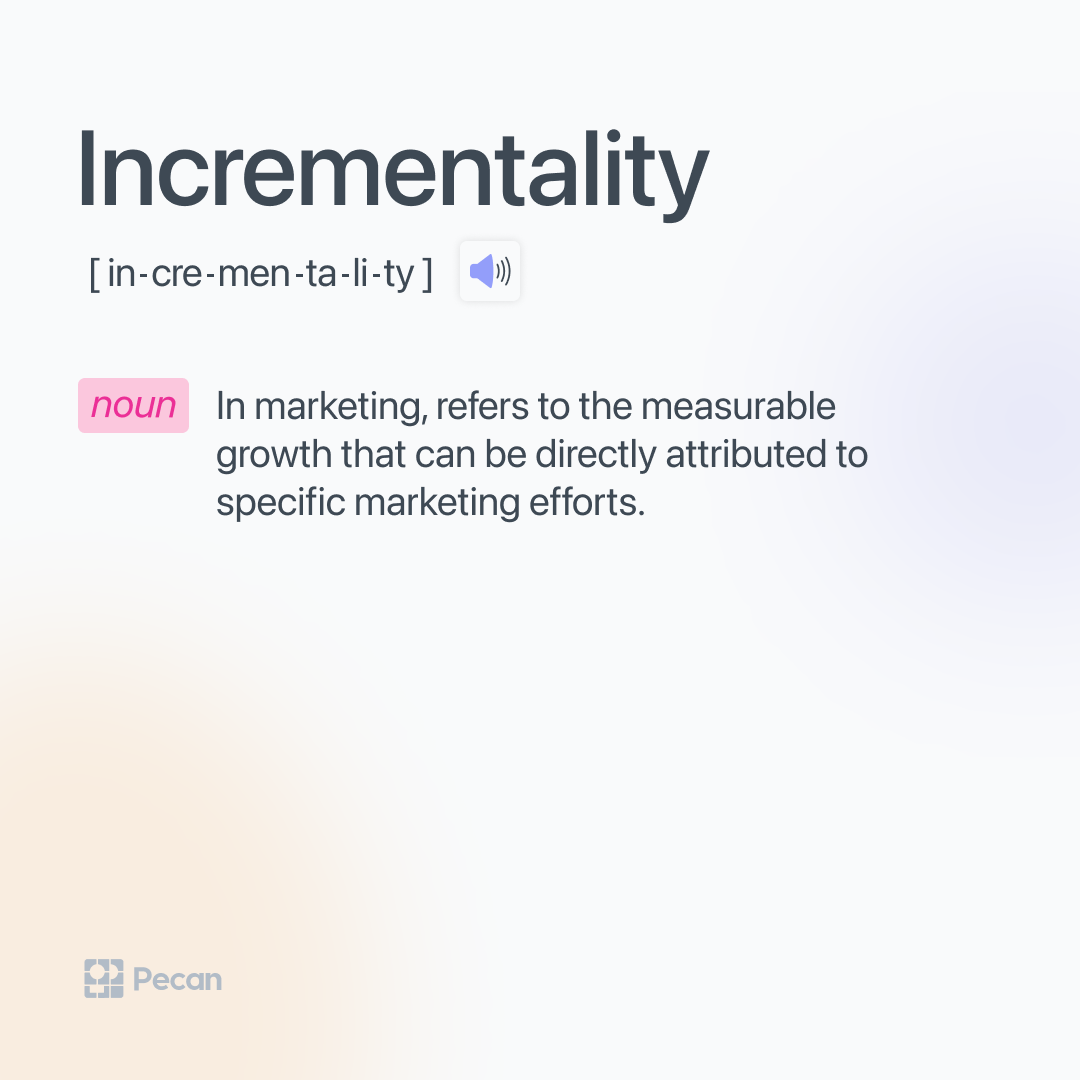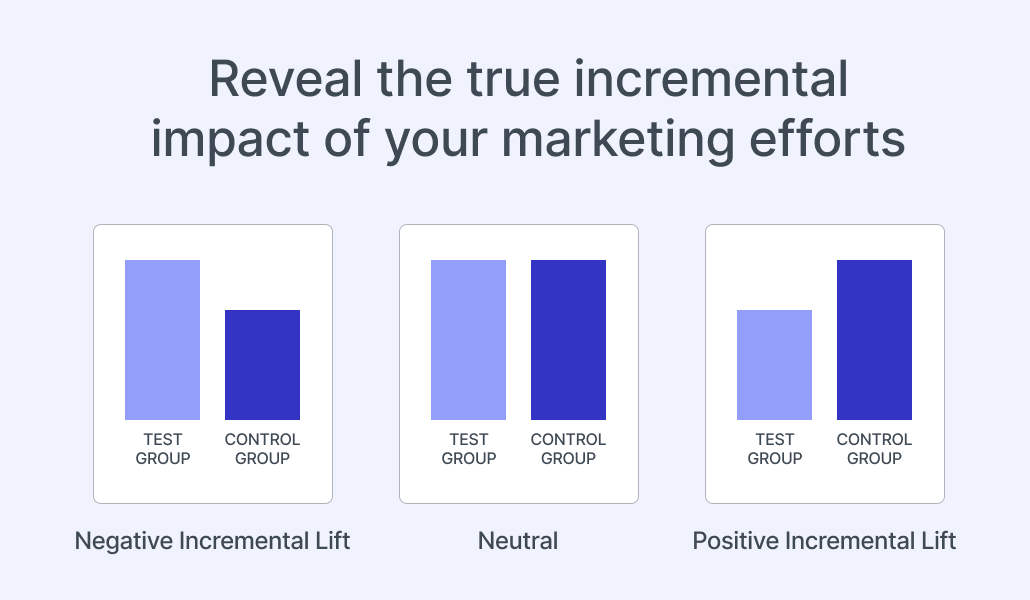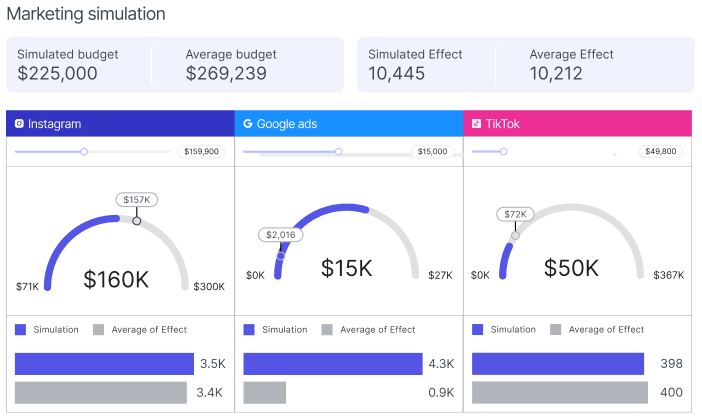In a nutshell:
- Incrementality in marketing refers to the measurable growth directly attributed to specific marketing efforts.
- It focuses on determining how much these efforts contribute to increased sales and other desired outcomes.
- Incrementality testing helps marketers fine-tune their resource allocation and make data-driven decisions.
- Marketing mix modeling (MMM) quantifies and predicts the incremental impact of every marketing channel, even offline ones.
- MMM helps optimize marketing campaigns for superior performance and incremental improvements at scale.
Relying on a single channel for your marketing campaigns is like a pizza shop trying to increase sales while offering dine-in only. To satisfy a wide range of preferences and tastes, you’ll need to meet your customers where they’re at, through a variety of channels.
But here's the kicker: With so many different media — online and offline — it’s become increasingly difficult for digital marketers to measure the effectiveness of each channel and tactic. To succeed, marketers need to integrate and analyze data from different sources to optimize their campaigns and budgets.
Enter the concept of "incrementality." When you're measuring your campaign effectiveness, understanding the meaning of incrementality becomes paramount — it's the key to quantifying the impact of every marketing effort, whether that’s a specific tactic, channel, or entire campaign.
If you're looking for a new method to measure your marketing results, this article is your quick guide to all things incrementality. And, spoiler alert, we'll reveal why marketing mix modeling (MMM) gives digital marketers a competitive advantage.
What is incrementality in marketing?
Just as a pizzeria crafts its menu with care, marketers must strategically plan their campaigns, distributing resources wisely. For instance, you wouldn't want to allocate a significant budget to an underperforming channel — or stock up on an unpopular pizza topping (we see you, anchovies).
So, how do you make optimal decisions around channel or ad spend? With incrementality.
The meaning of incrementality in marketing
Incrementality in marketing refers to the measurable growth that can be directly attributed to specific marketing efforts, such as a particular media channel, tactic, or campaign. It focuses on determining how much these efforts contribute to increased sales, newsletter sign-ups, and other desired outcomes.
To measure incremental growth, marketers use controlled experiments, like A/B testing, to measure the incremental difference in varying tactics. It’s like comparing customer responses to classic cheese pizza (the control group) and pepperoni (the test group). There's even the option to introduce something unique, like ghost peppers, to observe reactions (we’d love to be a fly on the wall!).
This systematic approach helps marketers fine-tune their resource allocation, enhance campaign performance, and, most importantly, make data-driven decisions. Incrementality testing even shows whether a campaign genuinely propels incremental conversions — or if those conversions would have happened regardless.
The state of incrementality today
The modern marketing mix now encompasses an array of channels, from social media and influencer marketing to traditional billboards and print advertising efforts. When marketers engage audiences across many channels, including online and offline, it becomes increasingly difficult to pinpoint the impact of any individual tactic.
Data adds another layer of complexity. It's often fragmented, coming from different sources with key information missing, like customer data gaps, limited insights into end-to-end customer journeys, and incomplete tracking of various touchpoints.
The recent wave of stricter data regulations isn’t helping. With the imminent loss of third-party cookies and evolving privacy policies of social media platforms and mobile devices, marketers must gather more first-party data (customer behavior) and zero-party data (customer input) to create and launch effective campaigns.
Incrementality measured through simple A/B testing isn’t scalable enough to navigate this intricate marketing landscape. You’ll need the power of artificial intelligence (AI) and machine learning packaged in a marketing analytics platform that’s as accessible as a pizza box.
What is the difference between attribution and incrementality?
You might not have heard of incrementality, but you've probably heard of marketing attribution. Attribution and incrementality are two concepts often used in marketing and advertising to measure the effectiveness of campaigns. They're related — but different.
Attribution refers to assigning credit to different marketing channels or touchpoints for a specific outcome, such as a purchase or subscription. Attribution tries to determine which channels or touchpoints contributed to that outcome and in what proportion. Attribution models, such as first-click, last-click, or multi-touch, each use their own methods to assign credit to various touchpoints. (Check out our deep dive on attribution methods.)
But attribution doesn't always work well alone, especially in today's complex customer journeys with many touchpoints across multiple channels. Measurement methods focused on incrementality can better assess the true impact of a marketing campaign. The goal is to determine the incremental lift or additional value generated by the campaign, beyond what would have occurred naturally.
While attribution provides insights into the contribution of different touchpoints, incrementality measurement goes a step further by isolating the true impact of a campaign. It helps marketers understand the actual value generated by their marketing efforts and make data-driven decisions to optimize their strategies.
Attribution and incrementality are both powerful approaches to marketing measurement, and both concepts are essential for understanding the effectiveness of marketing efforts and optimizing media investments.
And while attribution methods have been hotly debated among marketers for some time, marketing mix modeling and its focus on incrementality are stealing the show today.
What is marketing mix modeling?
Marketing mix modeling (MMM), sometimes called media mix modeling, helps quantify and predict the impact of every marketing channel, even the offline ones, in complex multi-channel campaigns. MMM operates at the channel level, so it’s beneficial when consumer data is unavailable.
Before stronger computing powers and readily accessible data, it could take months to get refreshed results from marketing channels. Back then, marketing mix modeling (MMM) was a time-consuming and complex process. Only the biggest advertisers could take advantage of it. But now, automated machine learning and data preparation offer a faster, easier way for marketers to update their budgets as things change in real time.
At its core, MMM seeks to reveal how much of your revenue or conversions can be credited to each marketing channel. It provides insights that facilitate the allocation of marketing resources across channels, aligning them with your intended results. Building on the foundations of incrementality, MMM gathers data from all marketing channels, meticulously breaking down their contributions to your overall marketing success.
Does a specific marketing effort help increase results? MMM provides insights into the incremental lift of each marketing channel.
In more mouth-watering terms, MMM is like sampling every possible pizza topping combination across a chain of restaurants across multiple channels (in-store pick-up, phone order, mobile-app order, food trucks, and more!) It not only identifies the most popular toppings but also pinpoints those highest potential lifetime value customers likely to return for more.
While incrementality testing identifies the actual impact of a campaign on a specific group of customers, MMM takes incrementality a step further. It leverages these real-world results to validate and refine predictive models, fine-tuning your marketing campaigns for superior performance, and incremental improvements at scale.
In essence, MMM doesn't merely confirm that your fig and prosciutto pizza was a hit. With the help of predictive AI, MMM models can predict when it will be a hit, which customers will enjoy it the most, and the varying revenue depending on where you offer it. Equipped with this knowledge, you can target the right audience at the right moment, maximizing the effectiveness of your marketing efforts.
Using MMM to improve your marketing efficiency and ROI
Once you've uncovered data showing how a specific online ad campaign consistently drives substantial incremental conversions, you can then funnel a larger budget into this high-impact campaign, expanding your reach and driving even more incremental results. At the same time, you can reallocate resources away from underperforming efforts, effectively preventing budget waste and making better investment decisions.
Understanding the forces driving incremental results within your marketing activity empowers you to make data-driven decisions that revamp your marketing strategy and boost your return on ad spend (ROAS).
The "aha" moment, where you connect the dots between incremental insights and marketing efficiency, can be a game-changer. By understanding what genuinely works and what doesn't, you can respond to shifts in consumer behavior, emerging trends, and competitive challenges.
It's the difference between allocating resources based on intuition and making informed, strategic choices that consistently yield tangible results. Ultimately, it ensures that every marketing dollar invested contributes to your business's growth and success, increasing accountability and providing the best results.
Power incrementality with AI-powered MMM
Now that you have a clearer understanding of incrementality and the transformative power of AI–powered MMM, it’s time to unlock data-driven marketing excellence. You don’t have to wait months to get these capabilities up and running. Pecan automates data preparation, modeling, and predictive insights so you can start fine-tuning your marketing campaigns in a couple of days.
Ready to learn more and see the real meaning of incrementality measurement in action? Schedule a demo with us to see how you can start optimizing ROI with AI-powered MMM.






